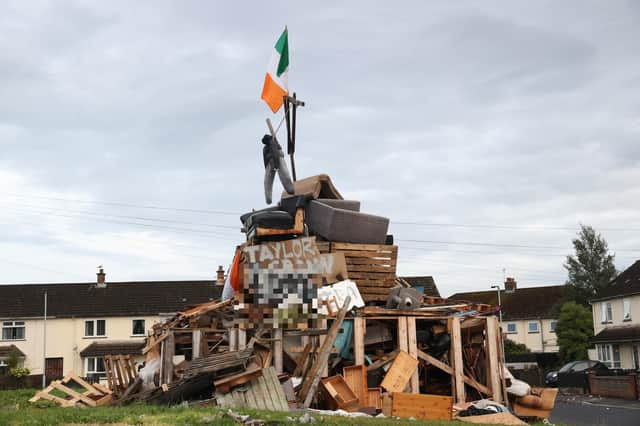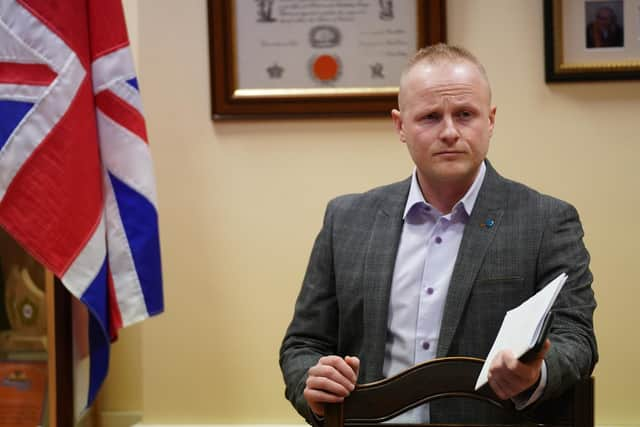Jamie Bryson: I see no moral or unionist strategic case to justify the burning of effigies or images of living politicians


There are a miniscule number of issues, such as burning of personalised effigies (which I treat as distinct from burning flags) and despicable attacks on ambulance staff.
In regards the latter, it does not require many words to describe those actions of a mindless, moronic and probably drunken minority: contemptible and disgusting.
Advertisement
Hide AdAdvertisement
Hide AdTurning to effigies/posters, I believe that if one disagrees with a political idea, identity or movement, then protest and critical and/or challenging comment ought to be directed against the positions espoused by your opponent, not against him or her personally.


As someone who is, on a daily basis, on the receiving end of deeply personal attacks, abuse, threats and Orwellian-type ‘pile ons’, I know better than most how it feels. It follows from this proposition that I do not find the burning of effigies of living persons or posters of politicians as individuals appropriate. That is quite different than believing such actions amount to a ‘hate crime’.
I wouldn’t accept that, and indeed even the European Court of Human Rights (beloved by liberals and nationalists in Northern Ireland) has held that burning images of the Spanish King was lawful.
As an aside, the hypocrisy of some who openly welcomed effigies of Boris Johnson or Donald Trump, and who cheered images of General Mike Jackson being plastered all over billboards in Londonderry with unfounded allegations, is noted. But just because something is a lawful expression (even if it shocks and offends), doesn’t mean that it is an appropriate or defensible one.
Advertisement
Hide AdAdvertisement
Hide AdI can’t see the moral case for burning effigies or posters of living persons, and I certainly don’t see any strategic objective or advantage for unionism/loyalism. Therefore, I think there needs to be a genuine discussion about collectively agreeing, as a means of voluntary regulation, to bring an end to this practice.
Those who would argue in favour of burning posters or effigies bear the burden of engaging in the debate and putting forward their argument. And if there is no credible argument which can be put forward, then that, in itself, would provide the answer. In regards the burning of flags, I believe that is a legitimate form of political protest. It is markedly different than, as with effigies, the personal targeting of individuals.
In the United States, one of the most patriotic Americans ever to sit on the US Supreme Court – Justice Antonin Scalia – defended the right to burn the USA flag, arguing that, offensive as he found it, that it was protected expression under the First Amendment.
However, whilst I have no issue with the political protest of burning Irish flags at bonfires, there is a case to be made that political protest entwined with a cultural celebration risks a cross-contamination of two markedly different things, with one undermining the other.
Advertisement
Hide AdAdvertisement
Hide AdIn recent years the mostly excellent West Belfast festival which is a celebration of nationalist culture and tradition, has had all the positive aspects of their almost two-week long programme of events overshadowed by the political messaging on the final night with pro-IRA chants. If we are to reflect and question if there is similar issue, then the political protest of burning the Irish flag, when the protest is made via the vehicle of a cultural celebration, perhaps risks overshadowing that celebration by entwining two different activities: cultural celebration and political protest.
The latter, by definition, will always be contentious, the former need not be so. But this is an internal discussion which needs to be had across the unionist and loyalist community. I have written before about the disconnect between political unionism and what I term ‘cultural loyalism’.
There are thousands of people who are highly politically motivated, who fill the streets for band parades or spend months building bonfires, but paradoxically who do not vote and are totally disengaged from the political system.
That demographic isn’t going to be moved one iota by a strongly condemnatory tweet by Doug Beattie, in fact, that’s more likely to further entrench a great many who simply forever feel under siege and this – and their sense of alienation – is only compounded when the likes of Mr Beattie takes to social media to condemn them. No one is ever going to remove a flag or poster from a bonfire because the Ulster Unionist Party say so. Condemnation or coercion is never going to work; engagement and persuasion is the only way forward.
Advertisement
Hide AdAdvertisement
Hide AdI advocate self-critical reflection on this year’s bonfire events, and a genuine debate around how to best preserve our proud culture and identity, whilst also continuing to make political-protest if necessary, but perhaps not at the same time, or in the same manner.
• Jamie Bryson is NI Director of the Centre for the Union